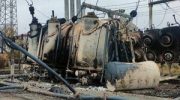Although we are talking about a deposit, the development of which causes earthquakes.
Groningen, which is currently in the process of being closed due to hundreds of earthquakes caused by its development. Bloomberg writes about it.
Since 1963, Groningen has been the backbone of Europe's gas supply and still has about 450 billion cubic meters of gas in reserve worth about $1 trillion. According to Shell Plc, which participates in the operation of the field, it is possible to extract 50 billion cubic meters of gas per year more than now. Moreover, additional volumes of gas can be obtained almost immediately after launch.
However, there is a problem – the first small tremors in Groningen were recorded in 1986, and since then there have been hundreds of them. Although most are undetectable by instruments, a 3.6-magnitude earthquake struck the region in 2012, prompting thousands of property damage claims.
However, of the approximately 327,000 homes in the region, at least 127,000 suffered some degree of damage, according to the Groningen Institute of Mining. More than 3,300 buildings have been demolished in the area since 2012 because earthquakes made them unsafe.
Although European Internal Market Commissioner Thierry Breton recently said the Netherlands should reconsider its decision on Groningen, Wijlbrief has been pressured by colleagues from other EU countries.
However, the country is still sticking to its plan. However, Dutch Mining Minister Hans Wilbrief said regarding increasing production that the lack of gas “may force us to make this decision.” In particular, if hospitals, schools and houses will not be able to heat properly.
Read also: Russia offers gas to Europe through the surviving Nord Stream-2 thread
Related video
We remind you that Russia is ready to supply gas to Europe via the Nord Stream-2 pipeline, which was not damaged by the explosions. This was stated by the Deputy Prime Minister of Russia Alexander Novak.




